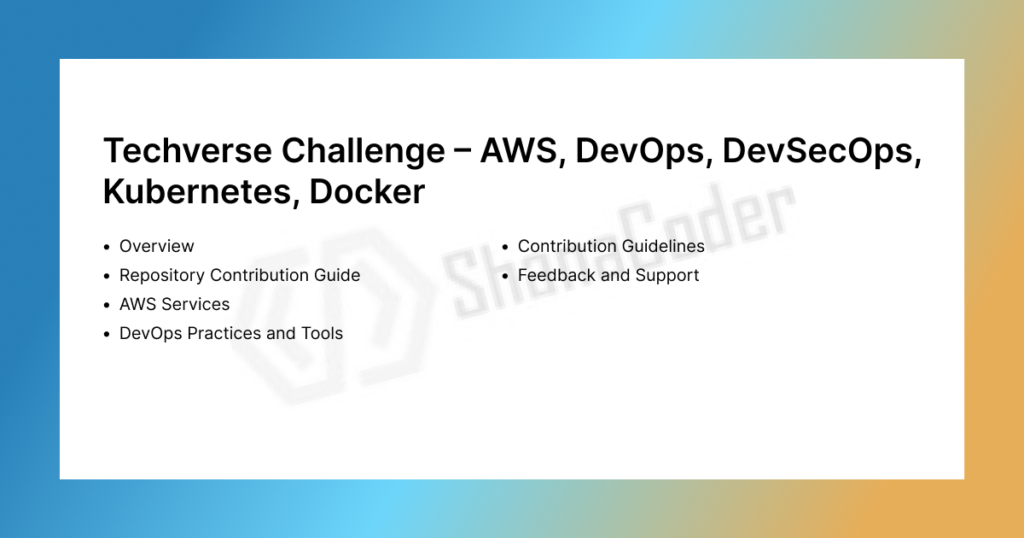Welcome to the Techverse Challenge dedicated to mastering AWS, DevOps, DevSecOps, Kubernetes, and Docker! This challenge is designed to enhance your skills in cloud computing, infrastructure automation, container orchestration, and security practices.
Overview
This challenge covers essential topics and tools in AWS, DevOps, DevSecOps, Kubernetes, and Docker. It is divided into four main sections:
- AWS Services
- DevOps Practices and Tools
- DevSecOps
- Kubernetes and Docker
Each section includes key concepts, tools, and best practices to deepen your understanding and proficiency.
Repository Contribution Guide
Fork the Repository
- Navigate to the repository page on GitHub.
- Click the “Fork” button to create a personal copy of the repository.
Choose a Focus Area
Select a focus area from the list below. For example, you might choose AWS Services to start your challenge.
Complete Each Section
- Organize your work neatly within the directories corresponding to each section.
- Document your configurations, scripts, and work thoroughly, ensuring they adhere to best practices and are well-tested.
Submit a Pull Request
- Push your completed work to your forked repository.
- Create a pull request to the main repository.
- Include a detailed description of your contributions and be ready to address feedback from maintainers.
Review and Merge
- Repository maintainers will review your pull request and provide feedback.
- Address any feedback promptly.
- Once approved, your pull request will be merged into the main repository.
AWS Services
Core Services
- EC2 (Elastic Compute Cloud): Scalable virtual servers
- S3 (Simple Storage Service): Object storage
- RDS (Relational Database Service): Managed relational databases
- Lambda: Serverless compute service
- IAM (Identity and Access Management): Secure access management
- Elastic Beanstalk: Application deployment and scaling
Additional Services
- Route 53: DNS and domain management
- CloudFormation: Infrastructure as Code (IaC)
- Elastic Load Balancing (ELB): Traffic distribution
DevOps Practices and Tools
Continuous Integration and Continuous Delivery (CI/CD)
- Version Control: Git, SVN
- CI/CD Tools: Jenkins, GitLab CI/CD, CircleCI
- Configuration Management: Ansible, Chef, Puppet
- Monitoring Tools: Prometheus, Grafana, ELK Stack
DevSecOps
Security Practices
- Security Automation: Streamline security processes
- Continuous Monitoring: Detect security threats and vulnerabilities
- Compliance and Governance: Ensure regulatory adherence
- Security Scanning Tools: SonarQube, Checkmarx, Fortify
- Vulnerability Management Tools: Nessus, OpenVAS
- Security Orchestration: AWS Security Hub, Azure Security Center
Kubernetes and Docker
Kubernetes
- Pods: Smallest deployable units
- Deployments: Manage ReplicaSets
- Services: Abstract communication between components
- Nodes: Worker machines
- kubectl: Command-line management tool
- Helm: Kubernetes package manager
- kubeadm: Bootstrap Kubernetes clusters
Docker
- Docker Images: Templates to create containers
- Containers: Portable, executable software units
- Dockerfile: Define image creation steps
- Docker Hub: Registry for Docker images
- Docker Compose: Manage multi-container applications
- Docker Swarm: Orchestration for Docker containers
Contribution Guidelines
- Fork the repository and create a new branch.
- Commit your changes with clear and concise messages.
- Push your changes and submit a pull request.
Feedback and Support
For any questions or support, open an issue in the repository or join the discussion forums.
Begin Your Challenge Today!
Master AWS, DevOps, DevSecOps, Kubernetes, and Docker by participating in this challenge. Expand your knowledge, collaborate with peers, and create impactful projects!


